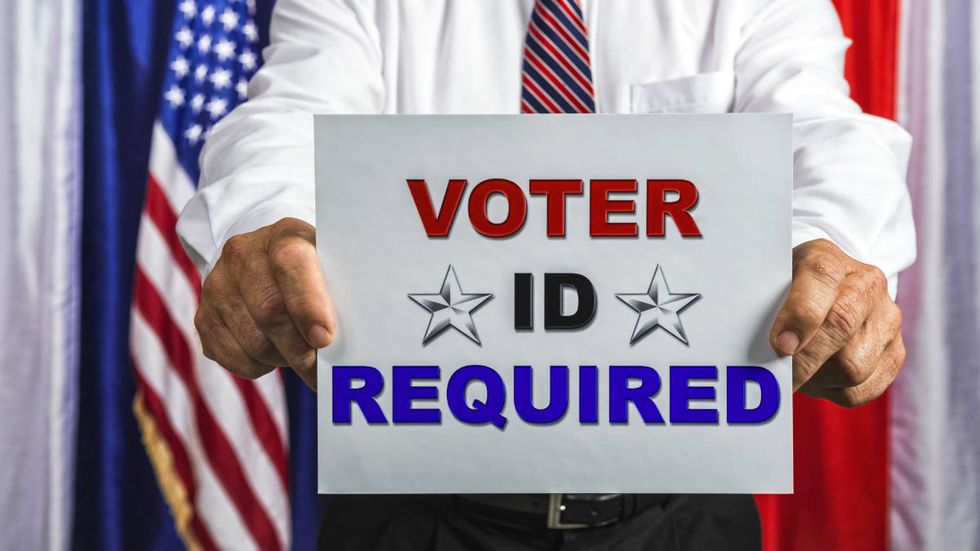
© 2024 Blaze Media LLC. All rights reserved.
On Monday, the Supreme Court blocked an attempt to reinstate North Carolina’s voter identification law, but it’s not the kind of sweeping victory that voter ID opponents might think it is.
In a court order issued on an otherwise slow news morning for the highest court in the nation, a special appeal to hear the case of North Carolina v. North Carolina State Conference of the NAACP failed to garner the five votes necessary to be granted a writ of certiorari, meaning that the Fourth Circuit’s current ruling against the law will stand for now.
The law was previously disparaged by the Fourth Circuit Court of Appeals as allegedly targeting black voters in the state “with almost surgical precision.” That court predicated a great deal its ruling on the state’s alleged motive in passing the law rather than the constitutionality of the law as written.
Several on social media celebrated the decision:
I'm all for less racism & more people voting, thanks #SCOTUS!#VoterID #votersuppression https://t.co/qc910v8R6K
— ??Tara Dublin ?? (@taradublinrocks) May 15, 2017
Wait! #SCOTUS just rejected North Carolina's attempt to reinstate shitty voter laws.This is good news. Which is an unfamiliar feeling.
— Negin Farsad (@NeginFarsad) May 15, 2017
Where to now, racists? ?? Strict North #Carolina Voter ID Law Thwarted After Supreme Court Rejects Case https://t.co/xLjEoI5vDd #SCOTUS
— Michael Deibert (@michaelcdeibert) May 15, 2017
The North Carolina attorney general also applauded the decision:
Great news! #SCOTUS denied cert in anti-voter case. Restrictions on NC voters are gone. Right to vote is fundamental https://t.co/BhlAt3GVkc
— Josh Stein (@JoshStein_) May 15, 2017
The law, which required voters to show photo identification for someone to vote, also cut down early voting while eliminating out-of-precinct voting and same-day registration – changes which bring ballot security into question.
It is important to note that this was not a ruling, nor does the denial of cert in this case say anything whatsoever about the constitutionality of voter ID laws. Rather, the denial of cert simply means the question of who is supposed to be bringing this particular case before the court right now is unclear.
The question of who has standing to bring this case stems from political changes in November’s 2016 election. Then-Republican Governor Pat McCrory lost his bid for reelection and was replaced by Democrat Governor Roy Cooper. The state’s legislature, however, is controlled by a Republican supermajority. Private lawyers were used to file an appeal on behalf of McCrory — whose administration originally filed the suit. Due to this power split, the use of a private attorney, and several other factors, the Supreme Court was beset with a “blizzard of filings over who is and who is not authorized to seek review” on behalf of the state at the highest level, reads the order written by Chief Justice John Roberts.
“[I]t is important to recall,” Roberts reminds in his concluding paragraph, “our frequent admonition that ‘[t]he denial of a writ of certiorari imports no expression of opinion upon the merits of the case.’”
This development doesn’t answer any fundamental questions about the constitutionality of voter verification requirements or the long-term status of North Carolina’s voter program. This was a simple denial of cert based on the complicated situation brought on by November’s election results in the Tarheel State.
But for now, while the question of North Carolinians’ right to conduct elections with enhanced integrity — and everyone else’s, for that matter —has simply been put on hiatus, not settled.
Want to leave a tip?
We answer to you. Help keep our content free of advertisers and big tech censorship by leaving a tip today.
Want to join the conversation?
Already a subscriber?
Nate Madden
Nate is a former Congressional Correspondent at Blaze Media. Follow him on Twitter @NateOnTheHill.
more stories
Sign up for the Blaze newsletter
By signing up, you agree to our Privacy Policy and Terms of Use, and agree to receive content that may sometimes include advertisements. You may opt out at any time.
© 2024 Blaze Media LLC. All rights reserved.
Get the stories that matter most delivered directly to your inbox.
By signing up, you agree to our Privacy Policy and Terms of Use, and agree to receive content that may sometimes include advertisements. You may opt out at any time.



